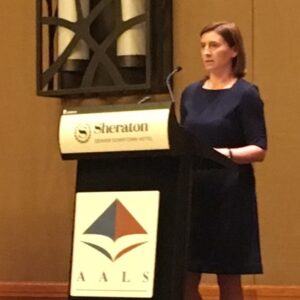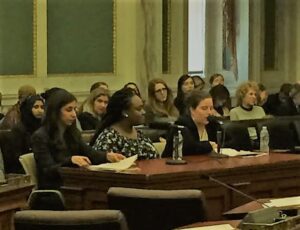Guest blogger Anne Bonfiglio, a second-year student at Temple Law, shares her reflections on last week’s Sheller-Center-sponsored panel (the first in our “Making Sense of the Legal Headlines” series).
Midway through the Q&A of last week’s panel on Border Security and Interior Enforcement, a student prefaced a question with the comment, “this is really depressing.” Exiting the event, a professor confessed that only seconds before that remark a colleague had whispered the same to her. For those who care about the rights of immigrants, January’s executive orders certainly are disheartening. For those in the country without status, they are terrifying. But I left with a more hopeful takeaway: these orders are vulnerable in the face of resistance.
The lecture, given by Professors Ramji-Nogales and Spiro, focused on the two Executive Orders signed January 25, 2017. The first, “Border Security and Immigration Enforcement Improvements,” orders the construction of the infamous border wall. The second, “Enhancing Public Safety in the Interior of the United States,” attacks “sanctuary jurisdictions” by removing their eligibility for Federal grants. Additionally, these orders authorize an expansion of detention facilities, expedited removal, and immigration officer hiring, expand the definition of a criminal alien, and require the publication of data supporting the President’s anti-immigrant position.
On their face, these provisions are alarming. Unfortunately, some, such as the expansion of expedited removal, are well within the President’s statutory authority (though they may present constitutional questions). But others are less secure. Some provisions, including increased hiring, detention, and the wall, are subject to Congressional budgetary approval. Others, like the various reporting obligations, have inadequate infrastructure. And the crackdown on sanctuary jurisdictions has at least three possible legal arguments against it: precedents prohibiting the commandeering of local law enforcement, constraining the use of funding to force compliance, and basic Fourth Amendment Protections.
While these orders have yet to be challenged in court, they can be resisted, whether through lawsuits or local community support of undocumented residents. As an immigrants’ rights advocate, I find inspiration in these possibilities. Yes, recent policy is depressing and the toll on families is staggering. But it is important that one doesn’t become overwhelmed by these costs. Immigrant advocates are mobilizing; as social justice lawyers and students, it is our job to promote an understanding of the legal arguments available in this fight.
Anne has put together two sets of links for further reading — one comprising legal sources, news and commentary, the other a collection of “know your rights” and other materials for community education and organizing.
 Justice Lab on behalf of the Youth Sentencing & Reentry Project, was chosen through a competitive process involving clinical work from across the country.
Justice Lab on behalf of the Youth Sentencing & Reentry Project, was chosen through a competitive process involving clinical work from across the country.

